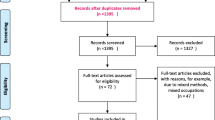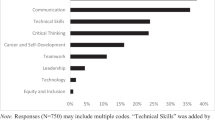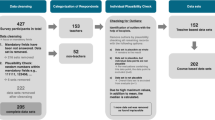Abstract
Educators, practitioners, and policy makers are calling for stronger connections between continuing education (CE) for professionals and the concerns of workplaces where these professionals work. This call for greater alignment is not unique to the health professions. Researchers within the field of higher education have long wrestled with the complexities of aligning professional learning and workplace concerns. In this study, we extend this critical line of inquiry to explore the possible conceptual intersections between two CE programs acting within a single healthcare organization. Both programs are concerned with improving patient care, primarily by changing the ways professionals think and talk with one another. However, the two programs have different historical origins: one in a workplace, the other within a university setting. Introducing the concept of “modes of ordering” as a way to analyze the curricula, we argue the programs are operating through separate logics of learning. We label these two modes of ordering: (1) learning as standardization and (2) learning as identification. Through our discussion, we explore how these different modes demand different roles for educators and participants. Ultimately, we argue that both have value. However, we also argue that educators require conceptual tools to sensitize them to the possibility of competing logics of learning and the subsequent implications for their practice as educators. In conclusion, we offer the metaphor of CE educator as choreographer, connecting concepts and practices within these logics in productive ways while continually navigating the various learning imperatives acting on professionals at any given time.
Similar content being viewed by others
References
Billett, S. (2010). The perils of confusing lifelong learning with lifelong education. International Journal of Lifelong Education,29(4), 401–413.
Bleakley, A., & Bligh, J. (2009). Who can resist Foucault? Journal of Medicine and Philosophy,34(4), 368–383.
Bratton, J., Mills, J. C. H., Pyrch, T., & Sawchuk, P. (2003). Workplace learning: A critical introduction. Toronto: University of Toronto Press.
Bryant, I., Johnston, R., & Usher, R. (2005). Adult learning in postmodernity. In I. Bryant, R. Johnston, & R. Usher (Eds.), Adult education and the postmodern challenge: Learning beyond the limits (2nd ed., pp. 1–26). New York: Routledge.
Cleland, J., Roberts, R., Kitto, S., Strand, P., & Johnston, P. (2018). Using paradox theory to understand responses to tensions between service and training in general surgery. Medical Education,52(3), 288–301.
Cohen, M. D., March, J. G., & Olsen, J. P. (1972). A garbage can model of organizational choice. Administrative Science Quarterly,17(1), 1–25.
Cohen, M. D., March, J. G., & Olsen, J. P. (2012). “A Garbage Can Model” At forty: A solution that still attracts problems. Research in the Sociology of Organizations,36, 19–30. https://doi.org/10.1108/s0733-558x(2012)0000036005.
Crotty, M. (1998). The foundations of social research: Meaning and perspective in the research process. Thousand Oaks, CA: Sage.
Dean, M. (2010). Governmentality: Power and rule in modern society (2nd ed.). Los Angeles, CA: Sage.
Elkjaer, B., & Brandi, U. (2014). An organizational perspective on professionals’ learning. In S. Billett, C. Harteis, & H. Gruber (Eds.), International handbook of research in professional and practice-based learning (pp. 835–856). New York: Springer.
Ellstrom, P. (2006). Two logics of learning. In E. Antonacopoulou, P. Jarvis, V. Andersen, B. Elkjaer, & S. Hoyrup (Eds.), Learning, working, and living: Mapping the terrain of working life learning (pp. 33–49). New York: Palgrave MacMillan.
Ellstrom, P. (2011). Informal learning at work: Conditions, processes, and logics. In M. Malloch, L. Cairns, K. Evans, & B. O’Connor (Eds.), The SAGE handbook of workplace learning (pp. 105–119). London: Sage Publications Ltd.
Engeström, Y. (1999). Expansive visibilization of work: An activity-theoretical perspective. Computer Supported Cooperative Work,8(1–2), 63–93.
Engeström, Y. (2008). From teams to knots: Activity-theoretical studies of collaboration and learning at work. New York: Cambridge University Press.
Evetts, J. (2013). Professionalism: Value and ideology. Current Sociology,61(5–6), 778–796.
Evetts, J. (2014). The concept of professionalism: Professional work, professional practice and learning. In S. Billett, C. Harteis, & H. Gruber (Eds.), International handbook of research in professional and practice based learning (pp. 29–56). New York: Springer.
Felstead, A., Fuller, A., Jewson, N., & Unwin, L. (2009). Improving working and learning. New York: Routledge.
Fenwick, T. (1996). Limits of the learning organization: A critical look. Retrieved December 23, 2019, from http://files.eric.ed.gov/fulltext/ED401395.pdf.
Fenwick, T., & Edwards, R. (2010). Actor-network theory in education. New York: Routledge.
Foucault, M. (1970/1981). The order of discourse. In R. Young (Ed.), Unyting the text: A post-structuralist reader (pp. 51–78). Boston, MA: Routledge.
Foucault, M. (1982). The subject and power. Critical Inquiry,8(4), 777–795.
Foucault, M. (1991). Governmentality. In G. Burchell, C. Gordon, & P. Miller (Eds.), The foucault effect: Studies in governmentality (pp. 87–104). Chicago, IL: University of Chicago Press.
Fournier, V., & Grey, C. (2000). At the critical moment: Conditions and prospects for critical management studies. Human Relations,53(1), 7–32.
Frost, N. (2001). Professionalism, change and the politics of lifelong learning. Studies in Continuing Education,23(1), 5–17. https://doi.org/10.1080/01580370120043.
Gherardi, S., & Perrotta, M. (2014). Becoming a practitioner: Professional learning as social practice. In S. Billett, C. Harteis, & H. Gruber (Eds.), International handbook of research in professional and practice-based learning (pp. 139–162). New York: Springer.
Heracleous, L., & Hendry, J. (2000). Discourse and the study of organization: Toward a structurational perspective. Human Relations,53(10), 1251–1286.
Hodges, B. D., Martimianakis, M. A., McNaughton, N., & Whitehead, C. (2014). Medical education… meet Michel Foucault. Medical Education,48(6), 563–571.
Hordern, J. (2014). Productive systems of professional formation. In S. H. Billett & H. Gruber (Eds.), International handbook of research in professional and practice based learning (pp. 163–193). New York: Springer.
Kendall, G., & Wickham, G. (2003). Using Foucault’s methods. Thousand Oaks, CA: Sage.
Kitto, S., Price, D., Jeong, D., Campbell, C., & Reeves, S. (2019). Continuing professional development. In T. Swanwick, K. Forrest, & B. O'Brien (Eds.), Understanding medical education: Evidence, theory, and practice (3rd ed., pp. 263–274). Hobekon, NY: Wiley.
Kitto, S., Sargeant, J., Reeves, S., & Silver, I. (2012). Towards a sociology of knowledge translation: The importance of being dis-interested in knowledge translation. Advances in Health Sciences Education,17(2), 289–299.
Latour, B. (1993). We have never been modern. Cambridge, MA: Harvard University Press.
Law, J. (1994). Organizing modernity. Oxford: Blackwell Publishers.
Law, J. (2003). Ordering and obduracy. Retrieved December 23, 2019, from http://www.comp.lancs.ac.uk/sociology/papers/Law-Ordering-and-Obduracy.pdf.
Law, J. (2008). After method: Mess in social science research. New York: Routeledge.
Links, M. J. (2018). Beyond competency-based continuing professional development. Medical Teacher,40(3), 253–258.
Maxwell, J. A. (2013). Qualitative research design: An interactive approach (3rd ed.). Thousand Oaks, CA: Sage.
Nance, J. J. (2008). Why hospitals should fly: The ultimate flight plan to patient safety and quality care. Toronto: Second River Healthcare Press.
Nerland, M. (2018). Knowledge practices and relations in professional education. Studies in Continuing Education,40(3), 242–256. https://doi.org/10.1080/0158037X.2018.1447919.
Olson, C. A. (2012). Twenty predictions for the future of CPD: Implications of the shift from the update model to improving clinical practice. Journal of Continuing Education in the Health Professions,32(3), 151–152.
Raelin, J. A. (2007). The return of practice to higher education: Resolution of a paradox. The Journal of General Education,56(1), 57–77.
Ragin, C., & Becker, H. (Eds.). (2009). What is a case?: Exploring the foundations of social inquiry. New York: Cambridge University Press.
Rhodes, C., & Scheeres, H. (2004). Developing people in organizations: Working (on) identity. Studies in Continuing Education,26(2), 175–193. https://doi.org/10.1080/158037042000225209.
Rose, N. (1999). Powers of freedom: Reframing political thought. New York, NY: Cambridge University Press.
Rowland, P., & Kitto, S. (2014). Patient safety and professional discourses: Implications for interprofessionalism. Journal of Interprofessional Care,28(4), 331–338.
Schinkel, W. (2007). Sociological discourse of the relational: The cases of Bourdieu & Latour. The Sociological Review,55(4), 707–729.
Schneeweis, S., Ahmed, S., Burhan, A., & Campbell, C. (2016). Competency based CPD: Implications for physicians, CPD providers, and health care institutions. Retrieved December 23, 2019, from Ottawa: http://www.royalcollege.ca/rcsite/cbd/cpd/competency-cpd-white-paper-e.
Spencer, B. (2001). Changing questions of workplace learning researchers. New Directions for Adult and Continuing Education,2001(92), 31–40. https://doi.org/10.1002/ace.38.
Spicer, A., Alvesson, M., & Kärreman, D. (2009). Critical performativity: The unfinished business of critical management studies. Human Relations,62(4), 537–560.
Tavory, I., & Timmermans, S. (2014). Abductive analysis: Theorizing qualitative research. Chicago, IL: The University of Chicago Press.
Thompson, C. (2005). Making parents: The ontological choreography of reproductive technologies. Cambridge, MA: MIT Press.
Van Hoof, T. J., & Meehan, T. P. (2017). Integrating essential components of quality improvement into a new paradigm for continuing education. The Journal of Continuing Education in the Health Professions,37(4), 274–280. https://doi.org/10.1097/CEH.0000000000000180.
Weick, K. E., & Sutcliffe, K. (2015). Managing the unexpected: Sustained performance in a complex world. Hobekon, NY: Wiley.
Weick, K. E., Sutcliffe, K., & Obstfeld, D. (2008). Organizing for high reliability: Processes of collective mindfulness. In A. Boin (Ed.), Crisis management (Vol. 3, pp. 31–66). Los Angeles, CA: Sage.
Acknowledgements
This study was funded by the Education Development Fund, Faculty of Medicine, University of Toronto, with matched support from the Centre for Interprofessional Education (University of Toronto). The authors would like to thank the following members of University of Toronto’s Centre for Interprofessional Education and University Health Network’s Caring Safely team for their support and thoughtful commentary on earlier drafts of this manuscript: Lynne Sinclair, Belinda Vilhena, Maria Tassone, Brenda Perkins-Meingast and Ivanka Hanley. Finally, the authors would like to thank Dr. Simon Kitto from the University of Ottawa for his commentary on the conceptual framing of this study and for his critical review of draft manuscripts.
Author information
Authors and Affiliations
Corresponding author
Additional information
Publisher's Note
Springer Nature remains neutral with regard to jurisdictional claims in published maps and institutional affiliations.
Rights and permissions
About this article
Cite this article
Rowland, P., Boyd, V., Lising, D. et al. When logics of learning conflict: an analysis of two workplace-based continuing education programs. Adv in Health Sci Educ 25, 673–689 (2020). https://doi.org/10.1007/s10459-019-09952-y
Received:
Accepted:
Published:
Issue Date:
DOI: https://doi.org/10.1007/s10459-019-09952-y




